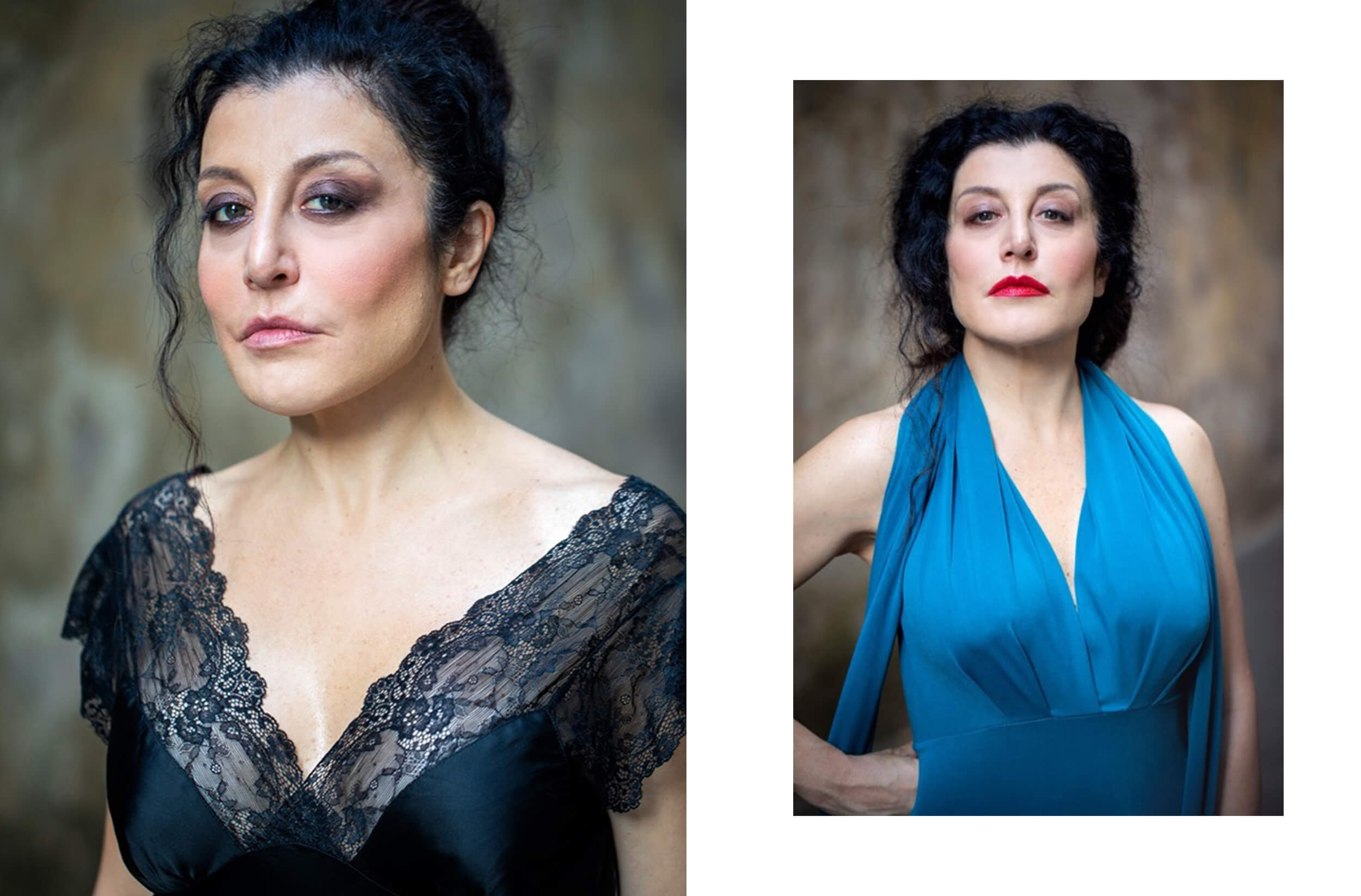Theatre and film actress, dubber and singer: in other words, an incredible multifaceted talent.
In other words, an incredible artist and woman.
Sarah Falanga told us about her career, the lessons she learned with teachers such as Andrea Camilleri, Vittorio Gassman and Dario Fo’, the importance of humility, diversity and making the difference, one of the many reasons that also led her to embrace the mission of the Amici per il Centrafrica Onlus [Friends for Central Africa]. After her roles in “My Brilliant Friend” and “Gomorrah,” the actress is currently playing Aunt Luciana in the stage adaptation of “Loose Cannons” by Ferzan Ozpetek. And what about her future? Sarah’s future is full of creativity and genuine hope, both for herself and other people.
Theatre and film actress, dubber, and singer: how did these passions come to be and how did you manage to combine them over time?
My passion for the Arts was born a long time ago and it’s part of the education to beauty and culture that I received from an early age. When I was three years old, I was taken to see “La Traviata” (“The Fallen Woman”) at the Royal Theatre of Saint Charles in Naples: on that occasion, my mother was worried that the opera could have been too much for me since it was “too demanding for a child.” But I surprised everyone because I watched the whole show, and I cried only during the curtain call of the cast. When they asked me, “why are you crying?”, I replied unexpectedly, “Again!”. I wanted to see once again that wonderful and colorful opera, and re-listen to the music that allowed me to dream! From that experience, I wanted to collect many more: concerts, painting exhibitions, stage performances, museums…I’ve never given up my “addiction” for Arts!
Over the years, the school fueled my passion and my curiosity for theatre; this was the place where I felt free. It was my favorite game! Then I chose to attend drama school (“Accademia d’Arte Drammatica”) and, in the meanwhile, I felt the need to improve myself. I’m still studying at the Actor’s Studio in Rome when I am not busy working on projects.
Singing then turned out to be the absolute freedom for my soul. And I would have never bet on myself: I am very shy and insecure. I didn’t choose the stage, the stage chose me.
Cinema is the great opportunity; music is the great freedom; and theatre is the great magic.
Dubbing is a unique, fun, and, at the same time, stressful experience, yet it fascinates me a lot. I was able, almost always, to combine all these jobs by constantly studying a lot… Sometimes I had to choose and to give up to something, giving priority not to the most “important” projects, but to those that gave me the greatest joy. It’s always been like this, now more than ever.
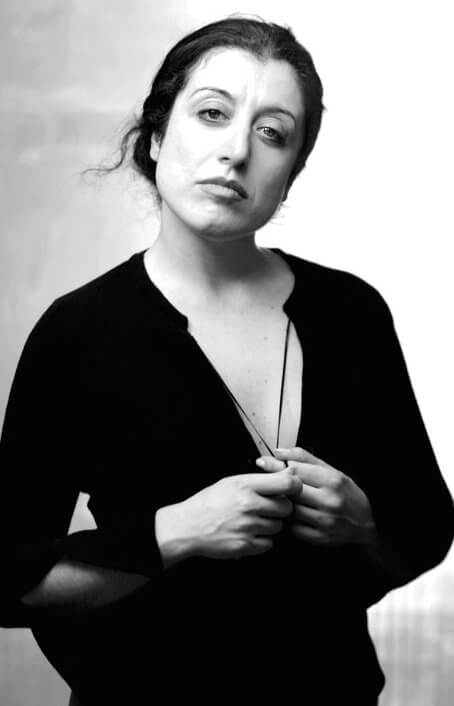
You had the chance to train with great masters such as Andrea Camilleri, Vittorio Gassman, and Dario Fo’: what’s the greatest lesson that you’ve learned over time?
COURAGE. The courage to study, to question yourself, to dare, to never give up, to not be afraid of difficulties!
And what’s the piece of advice that you would love to share with young people entering this field of work?
To study a lot and never settle… and be HUMBLE, and I’m talking about the real humbleness given by awareness, attention, and intelligence. Never bend, don’t let your soul get dirty, don’t accept compromises. Walk with your head held high, be proud of everything that you can conquer thanks to your abilities, and always do your best. The most important value? Dignity.
What do you prefer about the theatre and what instead of cinema/television?
About theatre, I prefer the direct and constant challenge with yourself and with the audience, the flow of energy, the inherent exchange during the “moment on stage.” About cinema, I love the truth, the introspection, the micro intentions…the deep feeling that an actor must seek to create a connection with the audience.
You are the artistic curator of the Accademia Magna Graecia: what message would you share with people to bring them closer to the theatre’s world?
I would simply say that theatre was born with mankind and is the cradle of us being. Without the theatre, nothing would have been and nothing would have been shared…
What woman from the past or present would you love to play someday?
Some goals have already been achieved: I had the honor of playing Medea and Filumena Marturano. I brought on stage a show dedicated to Anna Magnani and one to Mia Martini, a great satisfaction for my soul, but still unfinished. My goal is to improve these studies more and more. I would like to work on a great art film someday, proving myself in a strong inner and subtle role. When I was a kid, I wanted to be Elisabeth… Let’s see! I do not see them as goals, but as continuous and deeply complex studies. They are characters that I feel infinite, constantly in progress.
“Never bend, don’t let your soul get dirty, don’t accept compromises.”
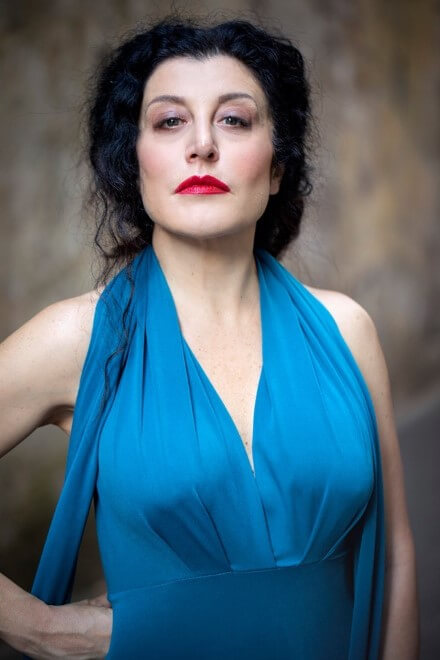
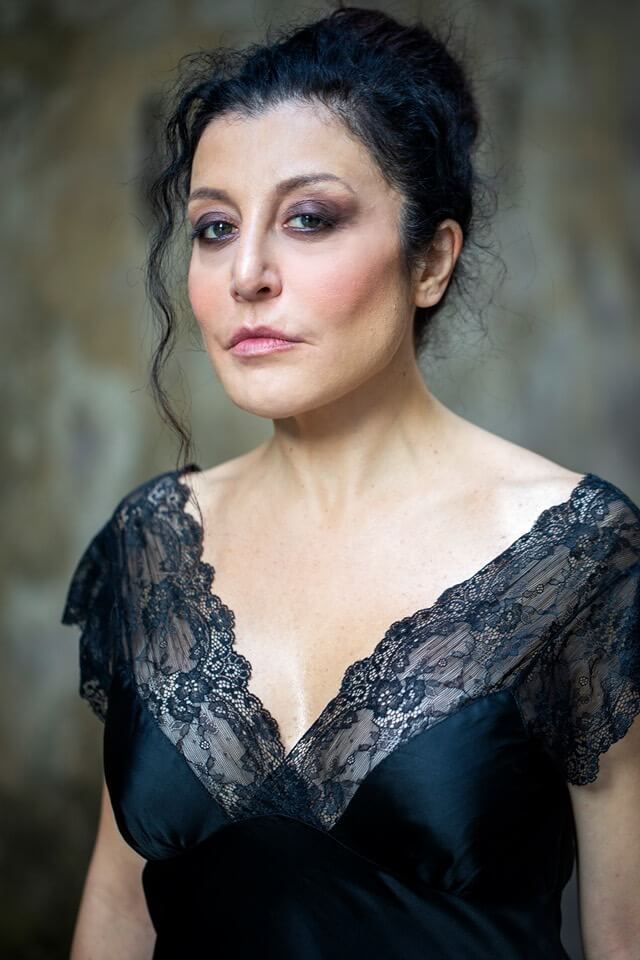
“…theatre was born with mankind and is the cradle of us being.”
“Gomorrah” and “My Brilliant Friend,” what was the best part of these two experiences?
These were two completely different artistic experiences, but both were significant for my growth. To me, what they have in common is the fact that both projects live in and of Naples, of a different Naples and lived by completely different characters in different historical moments.
What was it like to work with Saverio Costanzo?
It was an unexpectedly all-encompassing, wonderful experience! Saverio is a careful, delicate, intuitive, curious and respectful director. His work is made of very subtle nuances, a great delicacy and elegance.
Had you already read “My Brilliant Friend” before filming? And how did you prepare for the role of Maria Carracci?
I had already read the saga and, of course, I reread it to study it. Maria Carracci seemed like a character distant from me but then, even with the help of makeup, wig, costumes, I began to look at and see her in my mirror.
While looking for my character, my emotional memory brought me back the education that women who formed me had tried to pass on to me. From those models, I inherited many things but they had the ability to be silent, the dignity, the morality, the coercion in certain schemes, and the ability to hide decisions while taking them and the severity. I think there’s a lot of my grandmother and aunt in Maria Carracci.
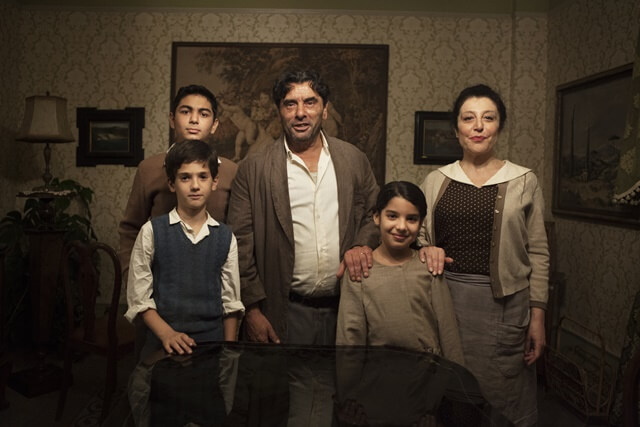
Let’s talk about your experience in “Loose Cannons:” what was the meaning of bringing to the stage such a famous movie?
“Loose Cannons” has been the biggest surprise of my work. I felt that Ferzan wanted to celebrate the 10th birthday of “Loose Cannons” through close contact with the audience. The play was highly anticipated, it was enthusiastically welcomed everywhere it was presented. Ferzan, besides having successfully directed “La Traviata” and “Madama Butterfly,” has tried for the first time to adapt for the stage one of his movies. For him, every sign, every silence, every nuance, every face, represents life. He’s a true soul artist. During the tour, it was a surprise for the actors to note that those who had seen the stage performance, unexpectedly, had found it even more pleasant than the movie. When on stage, the audience certainly enjoys much more direct contact with the characters and with the actors. Ferzan has also chosen to do a directing job able of going beyond the stage. He used his energies in a special formula of meta-theatre, giving new light to the story and assigning a leading role to the audience itself.
In “Loose Cannons” you play Aunt Luciana, how did you approach your character and how did you make it yours?
To be honest, I didn’t think I could be Aunt Luciana. I didn’t see myself as portraying her and I didn’t understand why Ferzan saw this character in me. In my artistic career that comes from the National Academy of Dramatic Arts, from the training with Camilleri, with Vittorio Gassman, from my artistic roots, which originate in Greek theatre and then in musical, I had never faced a character like Luciana and above all, I had never worked it in front of his creator-father. I did not see in me the sensuality, the physical part of the character, which represents a very beautiful and pleasant woman, who does not accept the fact of aging and tries to keep herself young. This trait is fundamental in the character’s analysis since those who do not want to grow old have not lived to the fullest, have not had the courage to experiment, to risk, to make mistakes, to mature!
She’s a woman who doesn’t grow up because she has many debts to herself.
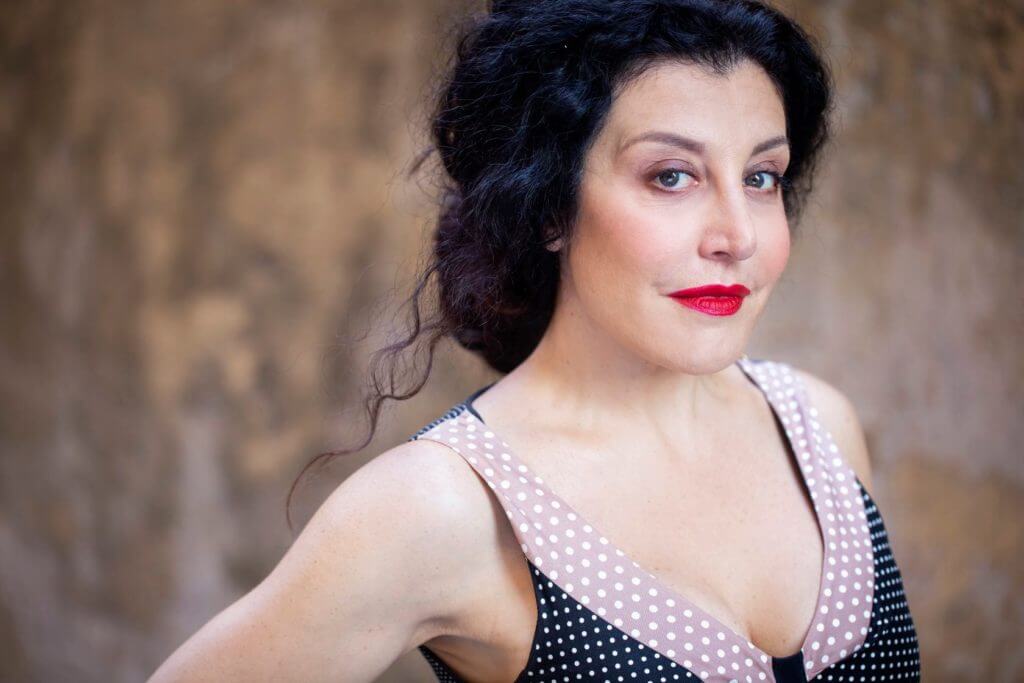
If we want to say it all, I’ve never really liked myself physically, I’ve always been hypercritical towards my body. I never thought I’d be a woman who could be so pleased about herself to dress in a certain way, I’ve always hidden myself a little bit. Ferzan, on the other hand, saw in me a certain kind of beauty, the sensuality of Aunt Luciana. He was, as always, a “seer” (I think this is one of his great gifts) because basically I’m a bit Aunt Luciana, but I didn’t know it, I had never thought about it…He taught me how to discover it and how to untie several “knots” about myself! I was born into a family that is governed by southern women, who educated me in a fairly rigid way, and “certain things” cannot be said and cannot be done. Luciana is also the victim of that prissy and excessive training, which doesn’t leave space for a “different” mind, which forces a mask on her and she is afraid of criticism, of the crisis, she does not question herself, she cannot experiment and therefore does not grow.
One of her addictions is alcohol: perhaps it is an element of liberation from the cage within which she is forced, from which she cannot free herself! She is not a heroine, unlike Antonio and Tommaso, her two grandchildren, who at one point and heroically, declare themselves for what they want to be. “Loose Cannons” speaks not only about homosexuality but of the right and coveted freedom of simply being, a recognizable condition in every human being! It is this freedom that Luciana never achieves. She doesn’t see well, because she doesn’t want to see where she could go, what she “could” do, how she should evolve. She’s scared! She is suspended, as in a limbo, waiting for a decision, the courage of a choice. She doesn’t see, she doesn’t talk, she hears half of everything. She only feels what she wants to feel, she stares at the emptiness, the infinity, which fascinates her.
How did your “friendship” with the Associazione Amici per il Centrafrica come to be?
I’ve always volunteered in my life. But this Association came to me at a very particular moment, when I was denied the presence of the man who gave me life. I was in Lecce with Ferzan Ozpetek; at noon my father passed away and the same evening I went on stage respecting my professional commitment. I thought he wanted me there, that I didn’t have to walk away from the stage. Three days later in Cremona, I met the Association and I learned about it from the words and enthusiasm of Carola, who as a volunteer deals with communication and the press office, and from the stories of the NGO’s solid work told on the same stage by the president of Amici per il Centrafrica. This NGO is unique because it is comparable to a family of volunteers and all of us who are part of it have a common goal. We help each other and do networking. There is an emotional and professional exchange. Also, you can really go to Bangui in the Central African Republic and see with your own eyes and be part of stories of mothers and children. Being a part of this made me feel good. There are children who are born and are children of life. We have a responsibility to them. Even without knowing it, we have disfigured their wealth. We have a duty to give them what we have, that’s what I think
What are your future projects, also related to the Associazione Amici per il Centrafrica?
In the immediate future, we are planning an exclusive event that will take place within the Archaeological Site of Paestum, the headquarter of the Accademia Magna Graecia, of which I have the privilege of being the artistic director since 2006. The event, scheduled for September 9th, will present the show “Medea… da Euripide in poi“, and will be a fundraiser for the Associazione Amici per il Centrafrica. A true and genuine gesture to give hope to the Central African people.

